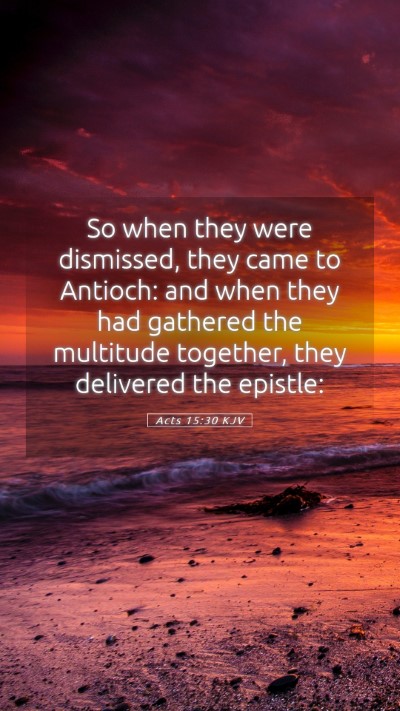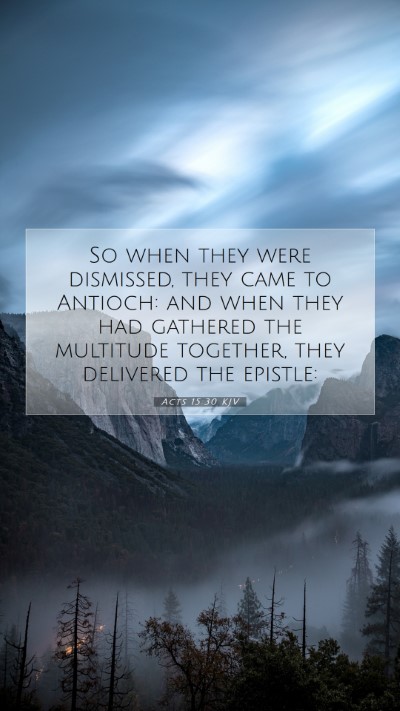Bible Verse Commentary on Acts 15:30
Bible Verse: Acts 15:30 - "So when they were sent away, they came to Antioch; and when they had gathered the multitude together, they delivered the epistle."
Understanding Scripture
The verse from Acts 15:30 occurs in the context of a pivotal moment in the early church. This passage signifies the fulfillment of a significant decision made during the Jerusalem Council, where the apostles and elders convened to discuss important matters concerning the Gentile believers and their relationship to Jewish law.
Bible Verse Meanings
The act of delivering the epistle is not just logistical; it carries deep religious implications. The decision reached at the council serves to unify the church and model a spirit of harmony and inclusiveness that the apostles were advocating for. The epistemological significance here is that God's grace transcends cultural boundaries, an essential teaching of the New Testament.
Bible Study Insights
- Consensus Decision-Making: The decision to send emissaries conveys a collective agreement among the church leaders, highlighting the church's commitment to divine guidance rather than human reasoning.
- Importance of Communication: The delivery of the letter symbolizes the transparency and accountability that the leaders maintained with their congregations, which serves as a model for modern church governance.
- Unity in Diversity: Acts 15 stresses the importance of accepting Gentile believers without imposing unnecessary burdens, showcasing an early emphasis on inclusivity in the Christian faith.
Bible Verse Interpretations
Commentators emphasize that the letter likely contained affirmations of the Gentiles' faith in Christ, coupled with specific guidelines for living a godly life outside the bounds of the Mosaic Law. This represents a shift in understanding God's covenant, demonstrating that faith and grace are fundamental to salvation.
Historical Context of Bible Verses
During the time of this event, the early church was navigating tensions between Jewish and Gentile believers. Acts 15:30 provides substantial insight into how the early church addressed such issues, reflecting a real historical struggle that shaped the trajectory of Christianity.
Biblical Exegesis
To engage in deeper biblical exegesis, it’s essential to consider the sociopolitical dynamics of the first-century church. By understanding the cultural challenges and the theological debates of the time, one can appreciate the weight of the decisions made and the importance of the letter that was sent to Antioch.
Applying Bible Verses to Daily Life
For today’s believers, Acts 15:30 encourages us to remain committed to unity within the body of Christ. It prompts questions about how we communicate our beliefs and how we accept others into our communities. The verse challenges us to reflect on the barriers we might be creating within our own congregations.
Significance of Acts 15:30
The significance of this passage lies in its affirmation of God's love extended to all humanity, regardless of cultural backgrounds, and it serves as a foundation for how the church can approach modern issues of inclusion and diversity.
Cross References
- Galatians 2:1-10 - The Jerusalem Council's decision.
- 1 Corinthians 9:20-22 - Paul’s approach to different cultural groups.
- Colossians 3:11 - The unity of believers in Christ regardless of distinctions.
Conclusion
In conclusion, Acts 15:30 is a vital scripture that encapsulates early Christian discourse about inclusion, grace, and community governance. By studying this passage alongside commentaries from sources like Matthew Henry, Albert Barnes, and Adam Clarke, we gain profound insights into its practicality for both ancient and modern believers.


